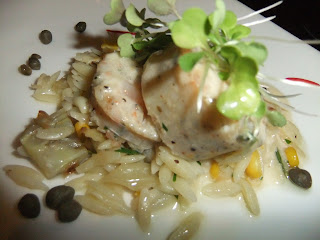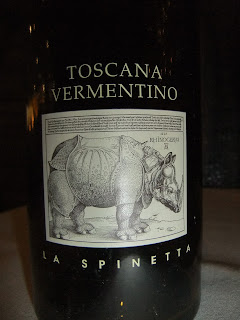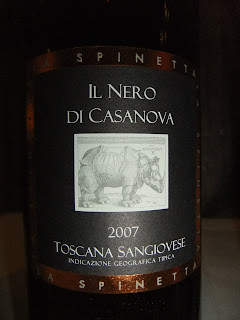No, I’m not referring to that quaint residential city
surrounded by Oakland. I’m referring to that Northwestern province in Italy
where the Nebbiolo grape is king producing spectacular Barolo and Barbaresco wines.
About 6 years ago, I was fortunate to attend a wine dinner featuring Alfie
Cavallotto and his wines from the Piedmont. Since Piedmontese winemakers rarely
visit Hawaii and since the house of Cavallotto is one of my favorite producers
of Barolo, It was a very memorable experience listening to Alfie Cavallotto and
sampling his wines.
Fast forward to June 2013 when we recently were fortunate
to share a table with another of the great winemakers in Northern Italy,
Giorgio Rivetti of La Spinetta. The last time Giorgio Rivetti visited Hawaii
was about 10 years ago when Vino Italian Tapas & Wine Bar first opened and
since one of my favorite grape varietals is king in Piedmont, I planned on
attending this wine dinner as soon as Chuck Furuya announced the dinner!
La Spinetta
The house of La Spinetta is young by Piedmont standards.
It was founded in 1977 by Giuseppe and Lidia Rivetti who produced their first
wine – a single vineyard Moscato the following year. In 1985 they introduced
their first red wine – a Barbera followed several years later by Pin, a blend
of Nebbiolo and Barbera. It wasn’t until 1995 that they produced their first
Barbaresco, Gallina which also was the first bottle to feature the rhinoceros drawing
and woodcut by the German artist Albrecht Dürer. According to Giorgio Rivetti,
the rhino had no connection to La Spinetta, they simply admired the artist’s
drawings. The Barbaresco Starderi and Valeirano soon followed and in 2000 they
produced their first Barolo Campe featuring a Dürer pencil drawing of a lion since
Barolo is the king (like the lion) of Nebbiolo.
Since then the 2nd generation of La Spinetta –
brothers Carlo, Bruno and Giorgio have acquired vineyards in Tuscany and
produce traditional grape varietals like Sangiovese and Vermentino in Central
Italy.
Learning from both
Masters
Chuck Furuya started the evening by briefly explaining
the basic differences between wines primarily highlighting the divide seen
between Old World (Europe) and New World (Americas, Australia, South Africa) wines
pointing out that while the New World highlights the grape varietal (Cabernet
Sauvignon, Chardonnay, etc.), the Old World features the location (Gevrey
Chambertin, Barolo, etc.) and values individual terroir characteristics.
Giorgio Rivetti added that his two main categories of
wines were Tasting Wines and Drinking Wines where Tasting Wines were big rich
wines that usually carried higher alcohol levels that were good for sipping but
difficult to pair with food. Drinking Wines had lower alcohol levels but
maintained good acid levels and were very food friendly. He also differentiated
between Winemakers and Farmers and stated that he was a Farmer who produced
Drinking Wines because if you take care of the vineyard and produce great
fruit, there isn’t much you have to do in the cellar.
Having sampled both Barolo and Barbaresco from the older
houses and the younger generation of Piedmontese winemakers, I do notice a
melding of Old World terroir and New World fruit forward winemaking where fruit
is upfront but not dominant. Stone, leather, licorice and tar are there but not
dominant. Oak is there but not dominant. And acids and tannins are still there
but in balance with the various flavors in the wine. And this is what I find
with La Spinetta’s wines.
Wine and Dine
The food and wine pairing for the evening looked like
this with my personal ratings and comments about each wine in parentheses:
Home-made Seafood
Sausage
with caramelized
fennel, roasted tomatoes, Kahuku corn & orzo
2010 La Spinetta
Toscana Vermentino (3.75/5)
(Good minerality
with pineapple and citrus on the nose. Candied
citrus on the
palate with good acid and a long finish)
Home-made
Papardelle
with shredded
braised, no growth hormone, no antibiotic chicken,
roasted
vegetables, wild mushrooms & sage
2007 Il Nero di
Casanova (4/5)
(Dark red fruit
followed by stone on the nose with ripe fruit on the
palate with good
concentration and balancing acidity with a long finish)
Roasted Stuffed
Lamb Loin
with Swiss Chard,
roasted fingerling potatoes & beets
2001 La Spinetta
Barbaresco “Starderi” (4.5/5)
(Ripe red fruit,
licorice and stone on the nose with dried red fruit and spice
on the palate with
a rich mouth feel and very long finish)
Ricotta Cheese
Panna Cotta
with dried
cherries & crushed nuts
2011 La Spinetta Moscato
d’Asti “Bricco Quaglia” (4.25/5)
(Mixed citrus,
white flowers and ripe fruit on the nose with an
ethereal flow on
the palate and a medium finish)
We normally also bring some wines from home to uncork
especially if it fits the theme of the evening so I brought a 2010 Cavallotto
Langhe, a white wine made exclusively from Pinot Noir and while it didn’t pair
as nicely with the Seafood Sausage as the Vermentino, it more than held up to
the Papardelle with Shredded Chicken. And since Giorgio Rivetti was seated
right across from me for the Entrée and Dessert courses, I uncorked a bottle of
2001 La Spinetta Barbaresco “Valeirano” and let him sample it before displaying
the bottle. He nodded with satisfaction that “This is a good wine”. After
showing him the bottle, “Ah, eet eez my wine”. And yes, it IS a VERY GOOD wine!
Since the production of the Barolo Campe is in the 1700
case range with the various Barbaresco produced in the 2800 case range (and
only 45% or so makes it to the US), the wines of La Spinetta aren’t the easiest
to find. However if you do a web search, you’ll see that San Francisco Wine
Trading Company and J.J. Buckley in the Bay Area occasionally has a stock of
the La Spinetta wines. Starting just under $20 up to the $100 price point, they
are a label I’ll occasionally splurge my hard earned dinero on and after
meeting Giorgio Rivetti, will continue to do so. They ARE that GOOD!












Comments